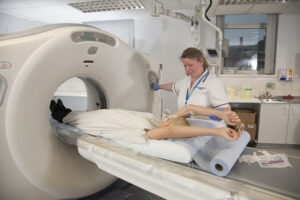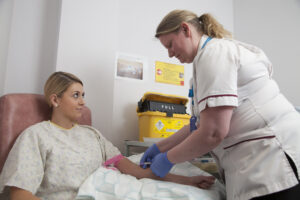CT scan
CT is short for computerised tomography. It is also known as a CAT (computer-axial tomography) scan. It uses x-rays to take a series of detailed pictures of the soft tissues inside of your body. A computer then builds these into a three-dimensional image.
What is it used for?
It can be used to diagnose and monitor a variety of different health conditions including brain tumours and certain bone conditions. It is also often used to look inside your body before you have another procedure, such as a biopsy.
Do I need to prepare?
You do not usually need to prepare for a CT scan. Someone on the team providing your care will explain what to do if you do need to prepare.
What happens during the procedure?
You lie on your back on a flat bed and the CT scanner rotates around your body while the bed moves you through the rotating beam. You need to remain still during the scan. It is painless and usually takes between 10 and 30 minutes.

Sometimes, before the scan you may be asked to drink a liquid, or have an enema or injection containing a dye (contrast medium) that makes your blood vessels or areas of your body such as your digestive system show up more clearly. This is called a contrast CT. The dye is harmless and will pass out of your body in your urine.

When the dye is put in you may feel very warm or have some pain. It can also make you feel sick or make you vomit. These feelings usually pass quickly. In rare cases it can cause an allergic reaction, so the radiologist will ask you if you have had an allergic reaction to iodine or contrast medium in the past or if you have any other allergies.
Go to www.nhs.uk for more information about CT scans
Contact us
If you have any queries about your scan please contact us on the relevant phone number below:
King’s College Hospital: 020 3299 3361
Radiology at Princess Royal University Hospital (PRUH): 01689 863642 / 01689 863673 / 01689 863674 / 01689 863675
